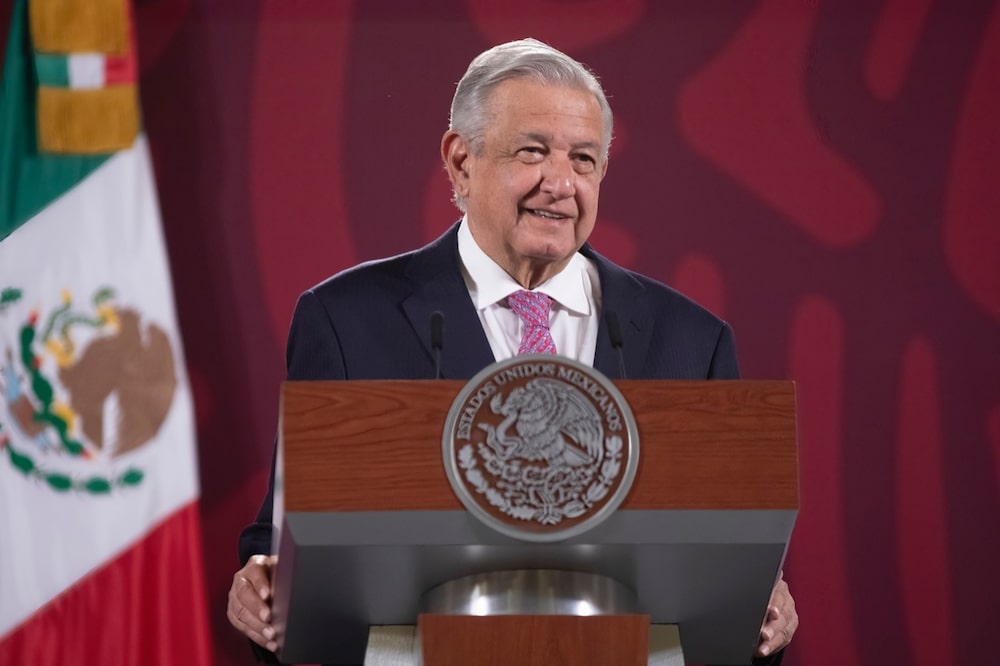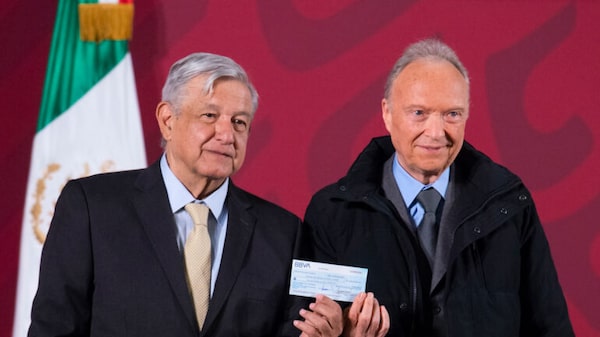Mexico City — Morena, the party of Mexico’s President Andrés Manuel López Obrador, won four of the six state governorships up for grabs in Sunday’s elections, weakening the power of the Institutional Revolutionary Party (PRI) and expanding its control to 22 of the country’s 32 states to become the country’s dominant political party.
On Sunday, more than 11.7 million Mexicans in the states of Aguascalientes, Durango, Hidalgo, Oaxaca, Quintana Roo and Tamaulipas were eligible to vote for governorships, among a total of 27 candidates (13 women and 14 men).
Morena and its allies the workers’ party (PT) and the green ecologist party (PVEM) won the Hidalgo, Oaxaca and Quintana Roo state governorships by a wide margin, and won in Tamaulipas with a narrower victory, according to the ‘rapid count’ carried out by the country’s electoral authority INE.
The ‘Va por México’ coalition, made up of the national action party (PAN), the PRI and the party of the democratic revolution (PRD) maintained control in Aguascalientes and Durango however.
The opposition coalition partners are historical foes, but have opted for the ‘strength in numbers’ strategy in a bid to beat Morena at all costs.

As a result of the elections, Morena now controls 20 of the country’s 32 states, becoming the new political hegemony in the country, a position held by the PRI for 70 years, and whose power began to be eroded with the 2000 presidential victory of Vicente Fox of the PAN.
However, if the state of San Luis Potosí is taken into account, which is governed by the PVEM, and the state of Morelos, governed by the social encounter party (PES), both of which allied with Morena in the elections and in Congress, the ‘coalition ‘together we’ll make history (Juntos Haremos Historia) under the banner of which AMLO ran for president in 2018, Morena’s control would extend to 22 states.
In Sunday’s elections, Morena further weakened the PRI’s position by taking the states of Hidalgo and Oaxaca from the former ruling party for the first time, and which is a blow to the PRI with a view to the states elections in 2023 in which governorships of the states of Mexico and Coahuila will be up for grabs, although both states are PRI strongholds.
The country has therefore woken up this Monday with a redrawn political map, with 22 states under the control of Morena and its allies, PAN with control of six states, PRI with two, and the citizens’ movement (Movimiento Ciudadano) party has two.
Aguascalientes
The rapid count places PAN-PRI-PRD coalition candidate María Teresa Jiménez as the winner of Sunday’s elections, with between 51.5% and 54.9% of the vote, while Morena candidate Nora Ruvalcaba obtained between 32.7% and 35.3%.
Citizen participation in the state was between 43.7% and 46.8%, with a total electoral roll of 1,008,750 citizens.
The INE’s preliminary results to 01:29 hours Monday gave the coalition candidate 53.76% of the votes.
Durango
Esteban Alejandro Villegas, candidate of the PAN-PRI-PRD coalition, obtained between 52.2% and 55.2% of the votes, according to the rapid count, while Alma Marian Vitela of the PVEM-PT-Morena-RSPD coalition received between 37.8% and 40.9%.
Voter participation was between 49.1% and 54.3% of those eligible to vote, with 1,070,193 citizens having voted.
To 04:00 hours Monday, and with 82.2% of votes counted, Villegas had garnered 53.9% of the vote in the state.
Hidalgo
The rapid count in Hidalgo points to victory for Julio Ramón Menchaca, candidate of the PT-Morena-NAH coalition, with between 60.4% and 63.2% of the vote, and which would be double that of PAN-PRI-PRD candidate Alma Carolina Viggiano, who garnered between 30% and 32.7% of the votes.
Citizen participation was between 45.3% and 48%, with 2,085,771 votes cast.
The rapid count reported at 4:18 hours on Monday that, with 92.1% of the votes counted, the Morena candidate had 61.9% of the votes.
Oaxaca
Oaxaca, which is one of the most-visited states by AMLO since he took office in December 2018, PT-PVEM-PUP-Morena coalition candidate Salomón Jara obtained between 58% and 61.4% of votes, giving him a wide advantage over the PRI-PRD candidate, Alejandro Avilés, who obtained between 24.3% and 27.2%.
The rapid count revealed that voter participation was between 37.4% and 40.5%, with 2,743,059 people eligible to vote in the southwestern state.
The state’s coastal areas were hit by Hurricane Agatha in late May, the first hurricane of this year’s season, and where tourist resorts such as Puerto Escondido, Mazunte and Zipolite were affected and some communities were cut off, with houses damaged and flooding reported further inland.
As of 04:25 hours Monday, Salomón Jara had emerged as the virtual winner with 60.21% of the votes, with 93.2% of polling stations having reported results.
Quintana Roo
Morena-PVEM-PT-FxM coalition candidate María Elena Lezama obtained 55.3% and 58.2% of the vote according to the rapid count, easily beating Laura Fernández, candidate of the PAN-PRD-CQR coalition, who obtained between 15.1% and 17.7% of the votes.
Citizen participation was between 37.7% and 41%, with 1,046,579 having cast their votes on Sunday.
As of 04:30 hours on Monday, Lezama had been attributed 56% of the votes cast.
Tamaulipas
The northeastern border state saw tighter election results, with the rapid count pointing to a victory for Américo Villareal, of the Morena-PT-PVEM coalition, with between 49.5% and 52.7% of the votes.
Turnout was between 51.6% and 55.6%, with 2,598,531 votes cast. At 04:30 Monday, Villareal had been attributed 50.1% of the votes, while his closest candidate, César Augusto Verástegui of the PAN-PRI-PRD coalition, had garnered 43.9%.




